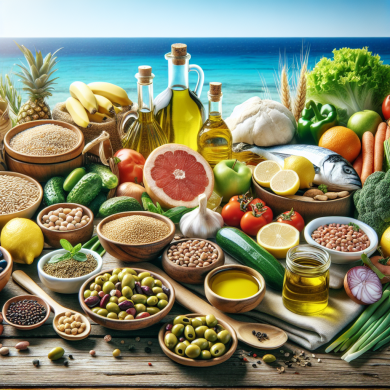Kickstart Your Mediterranean Diet Journey Today
Introduction to the Mediterranean Diet
The Mediterranean diet is more than just a diet; it’s a lifestyle inspired by the eating habits of countries bordering the Mediterranean Sea, such as Greece, Italy, and Spain. Celebrated for its numerous health benefits, this diet emphasizes whole foods, healthy fats, and a balanced approach to eating that can support heart health, weight management, and overall well-being.
Benefits of the Mediterranean Diet
Heart Health
One of the most significant benefits of the Mediterranean diet is its potential to improve heart health. Studies have shown that this diet can reduce the risk of heart disease by lowering cholesterol levels, reducing blood pressure, and improving overall cardiovascular function. The diet’s focus on healthy fats, particularly from olive oil and nuts, plays a crucial role in these benefits.
Weight Management
Unlike restrictive diets that can be difficult to maintain, the Mediterranean diet promotes a sustainable approach to weight management. By prioritizing whole foods and reducing processed foods, individuals can enjoy satisfying meals while managing their weight effectively. The high fiber content from fruits, vegetables, and whole grains also helps in maintaining a healthy weight.
Reduced Risk of Chronic Diseases
The Mediterranean diet has been associated with a lower risk of chronic diseases such as type 2 diabetes, Alzheimer’s disease, and certain cancers. The diet’s emphasis on plant-based foods, lean proteins, and healthy fats supports cellular health and reduces inflammation, contributing to overall longevity and health.
Improved Mental Health
Emerging research suggests that the Mediterranean diet may also support mental health. The high levels of antioxidants, vitamins, and minerals found in the diet can improve brain function and reduce the risk of depression and cognitive decline.
Essential Components of the Mediterranean Diet
Fruits and Vegetables
A cornerstone of the Mediterranean diet is a plentiful intake of fruits and vegetables, which provide essential vitamins, minerals, and antioxidants. Aim to fill half of your plate with colorful produce at every meal to maximize health benefits.
Whole Grains
Whole grains such as brown rice, quinoa, barley, and whole wheat bread are preferred over refined grains. They are rich in fiber and nutrients, helping to regulate blood sugar levels and support digestive health.
Healthy Fats
Healthy fats are a vital component of the Mediterranean diet. Olive oil, a primary source of fat, is rich in monounsaturated fats that promote heart health. Additionally, nuts, seeds, and fatty fish like salmon and sardines provide omega-3 fatty acids, which are essential for brain health and reducing inflammation.
Lean Proteins
The diet emphasizes lean proteins such as poultry, fish, legumes, and dairy products like yogurt and cheese. These sources provide essential amino acids without the saturated fats found in red meat.
Herbs and Spices
Instead of relying on salt, the Mediterranean diet uses herbs and spices to add flavor to dishes. Commonly used herbs include basil, oregano, rosemary, and thyme, all of which have their own health benefits.
Steps to Start Your Mediterranean Diet Journey
1. Stock Your Kitchen
Begin by stocking your kitchen with Mediterranean staples. This includes olive oil, fresh fruits and vegetables, whole grains, nuts, seeds, and a variety of herbs and spices. Having these ingredients on hand will make it easier to prepare Mediterranean-inspired meals.
2. Plan Your Meals
Meal planning is essential to successfully adopting the Mediterranean diet. Plan your meals around vegetables, whole grains, and lean proteins. Incorporate a variety of dishes to keep your meals interesting and flavorful.
3. Prioritize Plant-Based Foods
Aim to make plant-based foods the focus of your meals. Fill your plate with vegetables, legumes, and whole grains, and use meat as a side dish or flavor enhancer rather than the main component.
4. Embrace Healthy Fats
Use olive oil as your primary cooking oil and incorporate nuts and seeds into your meals and snacks. This will not only enhance the flavor of your dishes but also provide essential nutrients.
5. Enjoy Meals with Family and Friends
The Mediterranean diet is as much about enjoying meals with loved ones as it is about the food itself. Take the time to savor your meals and enjoy the company of others. This practice can improve mental well-being and create a positive relationship with food.
Sample Mediterranean Meal Plan
Breakfast
Start your day with Greek yogurt topped with fresh berries, a drizzle of honey, and a sprinkle of nuts. Pair it with whole-grain toast and a cup of herbal tea.
Lunch
Prepare a hearty salad with mixed greens, cherry tomatoes, cucumbers, olives, and grilled chicken, drizzled with olive oil and balsamic vinegar. Serve with a side of whole-grain bread.
Dinner
Enjoy grilled salmon with a side of quinoa and steamed vegetables. Season with lemon juice and fresh herbs for added flavor.
Snacks
Choose healthy snacks like hummus with carrot sticks, a handful of almonds, or a piece of fruit.
Overcoming Challenges
Transitioning to a Mediterranean diet may come with its own set of challenges. Here are some tips to overcome them:
Finding Time to Cook
Cooking at home is a fundamental part of the Mediterranean diet. To make this easier, dedicate a few hours on weekends to meal prep, such as chopping vegetables and pre-cooking grains and proteins.
Staying Consistent
Consistency is key to reaping the benefits of the Mediterranean diet. Set realistic goals and gradually incorporate Mediterranean principles into your daily routine rather than making drastic changes overnight.
Adjusting to New Flavors
If you’re not used to the flavors of the Mediterranean diet, start by introducing one new dish at a time. Experiment with different herbs and spices to find combinations you enjoy.
Conclusion
Embarking on a Mediterranean diet journey is a rewarding endeavor that can lead to numerous health benefits and an improved quality of life. By focusing on whole foods, healthy fats, and balanced meals, you can enjoy delicious, satisfying dishes that support your overall well-being. Remember, the Mediterranean diet is not just about food; it’s about embracing a lifestyle that prioritizes health, community, and enjoyment. Start your journey today and experience the transformative power of the Mediterranean way of eating.















Add comment